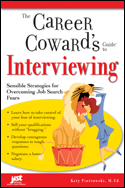
Tuesday, July 31, 2007
Dealing with "the Confidence Issue" in Your Career

Friday, July 27, 2007
Publishing Skills
I recently had to evaluate myself as part of my annual review. Part of the evaluation was listing the skills it takes to do my job. I've got a leg up on this because every darn book I edit talks about how to identify your skills. So I came up with this list. Keep in mind that many of these are skills that I have developed over my career. All I started out with was attention to detail, an aptitude for writing, a good education, and a good memory.
Market knowledge, intuition, negotiation, attention to detail as well as the big picture, intelligence, editing skills, written and spoken communication, 16 years of publishing experience, determination, consensus-building, vision, creativity, teamwork, prioritization, multitasking, optimism, enthusiasm, respect, research, networking, reputation, focus, dedication, ownership, flexibility, organization skills, computer skills, writing skills, patience, logic, design sense, time management, empathy, knowledge of publishing processes, initiative, confidence, tact, diplomacy, assertiveness, self-directedness, conceptual thinking, persuasive, customer-focused, deadline conscious, decisiveness, diligence, discipline, entrepreneurial thinking, judgment skills, independence, influencing, initiative, innovative, insight, perception, precision, productive, process-oriented, professionalism, profit-conscious, project management, resourcefulness, self-motivated, strategic thinking, strong work ethic, forecasting.
Tuesday, July 24, 2007
Check Out My New Office
Friday, July 13, 2007
Big Changes at JIST
We've gone from being a 50-person office owned by one eccentric millionaire to a 25-person office owned by a 100-person textbook publisher, EMC/Paradigm. And higher up, EMC is owned by a private equity fund. There are, of course, good and bad things about that change, the best being that we don't have to watch someone squander the money we make for him on second-hand RVs, armageddon-staving generators, classic cars, and railroad storage crates. But I digress.
In book publishing, mergers and acquisitions are routine. Sometimes they're good, and you get to work on a different product line, get a better office building, and maybe get a better benefits package (or in my case, I'm inheriting better office furniture). But often people lose their jobs, and those left just have to take on their responsibilities for the same pay. Really, it's no different than what's happening in the rest of corporate America these days. The key is to make yourself indispensible to your company, and to always be able to demonstrate how you contribute to the "bottom line."
So as of July 23, the new JIST offices are at 7321 Shadeland Station, Suite 200, Indianapolis, IN 46256. We are jazzed about the new selection of restaurants, the more convenient location, and the fact that all our departments will be closer to one another, so that hopefully, we can communicate better.
Tuesday, July 3, 2007
Occupational Hazard: Computer Vision Syndrome
Symptoms of CVS include the following:
- Headaches
- Loss of focus
- Burning/tired eyes
- Double/blurred vision
- Neck and shoulder pains
My condition was just diagnosed last Friday. For the past six months or so, I have noticed that the big aisle signs in Wal-Mart are now blurry. I have trouble focusing my eyes while driving. And I have always had terrible headaches. My mother-in-law and mom both said, "Well, yeah, you turned 40, so your eyes have gone bad. That's how it works."
So as someone who has made my living with my eagle eyes, and spent my childhood being the champion four-leaf-clover and morel finder, I realized I couldn't afford to let it get worse. So I went for my first eye exam in 7 years.
After a battery of high-tech tests (one of which even eliminates the need to dilate your pupils), my eye doctor announced that she thought I have CVS. Believe it or not, I still have 20/20 vision in one eye and 20/15 in the other, but because I strain my eye muscles constantly looking at details on the computer, they have trouble focusing on "the big picture," so to speak.
So I'm getting glasses. My first glasses ever. But I only have to wear them when I'm editing on the computer. They have a Teflon coating to reduce glare and make me look all brainy like Pearson CEO Marjorie Scardino. Well, maybe not so much like her.
To read more about CVS and how to minimize its effects, see http://www.allaboutvision.com/cvs/. Take care of your eyes. As an editor, they are absolutely your most valuable asset.